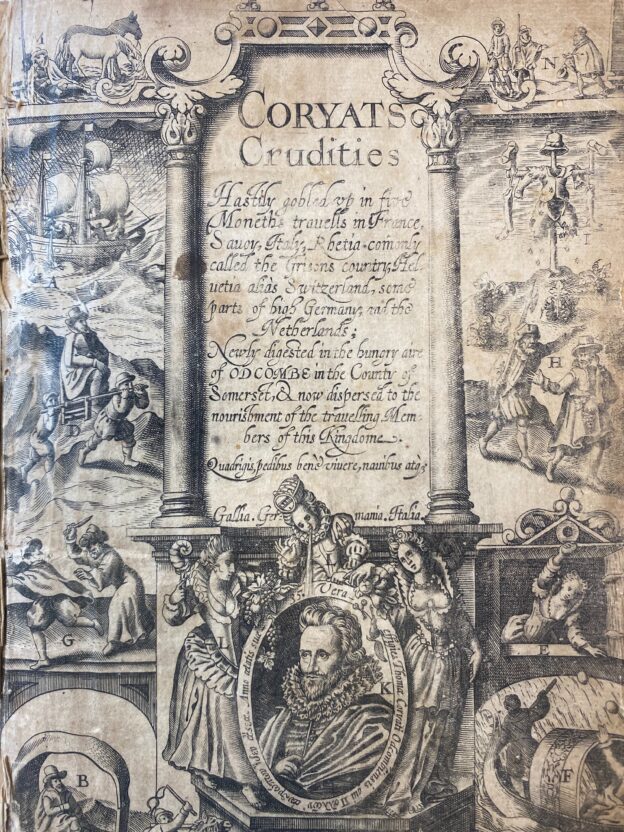- Facebook168
- Threads
- Bluesky
- Total 168
For reasons that Angela Nelson describes in this article, my office at Tufts contains about 2,000 books printed before 1800 that my late father collected. Recently, I brought a ladder to campus so that I can see what’s on the upper shelves. I’m planning to pull down a book or two at a time and blog occasionally about what I find.
For instance, I found a 1611 edition of Coryat’s Crudities. It is in characteristically poor condition, split into two parts along its spine, with its cover loose. As a result, its market value is just about zero. However, the split reveals some considerably older, Gothic printed text that was used to repair it.
A previous owner has hand-written a kind of index on five blank pages at the front. I am not certain, but I think this owner was the Obadiah Cookson who signed his name on the title page in 1754. If that’s true, it’s fascinating, because the Obadiah Cookson known to Google lived nearby in the Massachusetts Colony. My Dad bought most of his books in London, so possibly this one has made three Atlantic crossings.
As for the book: Thomas Coryat or Coryate was an eccentric, a courtier who seems to have been more laughed at than laughed with–most popular as a butt of jokes. In 1608, during a period of peace, he traveled in Continental Europe and published his Crudities as an anthology of notes, letters, anecdotes, and poems that he ostensibly collected along the way. It was the first work in English to tell the story of William Tell and the first to describe the implement that we call a fork:
The Italian and also most strangers that are commorant in Italy, doe alwaies at their meales use a little Forks when they cut their meat. … so that whatsoever he be that sitting in the company of any others at meale, should unadvisedly touch the dish of meate with his fingers from which all at the table doe cut, he will give occasion of offence unto the company, as having transgressed the lawes of good manners, insomuch that for his error he shall be at the least brow-beaten, if not reprehended in wordes.
Coryat adds that he still uses a fork in England, and a friend has nicknamed him “Furcifer”–fork-bearer.
The first pages of the book are headed, “Certain opening and drawing dystiches [two-line poems] to be applyed as mollifying Cataplasmes [poultices] to the Tumours, Carnosities, or difficult Pimples full of matter appearing in the Author’s front …”
In other words, if the author’s main text offends, you can apply his rhyming couplets for relief. For example:
Our Author in France rode on horse without stirrup And in Italie bathed himself in their syrrop.
These lyric gems are all attributed–falsely–to B[en] Jonson, who is also credited with an introductory poem in honor of Coryat. A different “charitable friend” purportedly wrote the character-sketch that comes next in the volume. This text describes the “famous … Traveler and Gentleman Author of these … Crudities” thus:
He is an Engine, wholly consisting of extremes, a Head, Fingers, and Toes. For what his industrious Toes have trod, his ready Fingers have written, his subtle head dictating. He was set a-going for Venice the fourteenth of May Anno 1608 and returned home (of himself) the third of October following.
We’re told that he absolutely loves to travel:
The mere superscription of a letter from Zurich sets him up like a top: Basil or Heidelberg makes him spin. And at seeing the word Frankford, or Venice, though but on the title of a Booke, he is readie to break doublet, cracke elbowes, and overflowe the roome with his murmure. Hee is a mad Greeke, no lesse then a merry, and will buy his Egges, his Puddings, his Ginger-bread, yea, cobble his shoes in the Atticke dialect …
This fellow seems to have been a sort of Yorick, or a Jacobean Edward Lear, or a bit like Anthony Bourdain in his enthusiasm for travel and food and his self-deprecating humor. I think I would have liked him, although at times he may have talked too much about himself.
See also: a seventeenth-century Englishman inside the Great Pyramid
